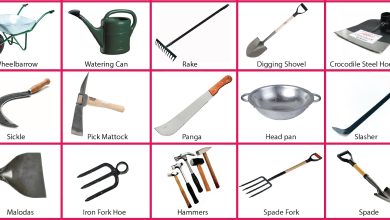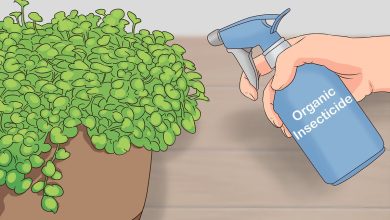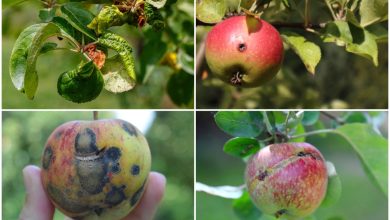Fertilize a Chestnut: How, When and How Much? – Sow100
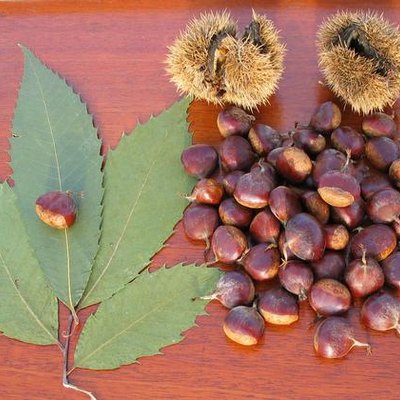
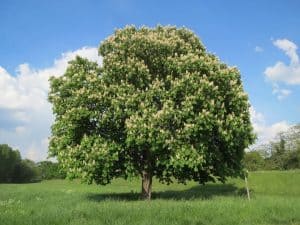 How could you get your chestnut trees in optimal condition so that they produce an incredible harvest?
How could you get your chestnut trees in optimal condition so that they produce an incredible harvest?
The answer is in a single line and it is: paying them correctly.
This is a fundamental care that is applied from before planting and that you must maintain throughout the growth and fruiting process.
Why? Because fertilization is a fundamental part of the puzzle of basic chestnut care, so it is better that you are well informed and here we will tell you everything.
Why is it important to fertilize chestnut trees?
It is interesting to fertilize chestnut trees for the following reasons:
- It causes a positive and definitive impact on the growth of plants, especially in the first years of life. This is key to the entire flowering and fruiting process that will happen later on.
- Increases the number of fruits obtained in each harvest, as well as their quality. In a chestnut plant, it is not only important what it is capable of producing, but also that the chestnut trees obtained have the ideal conditions for consumption and marketing.
- It keeps the plant healthy, preventing it from becoming a focus of interest for pests or diseases. Plants that have nutritional deficiencies are much more attractive to agents because they will not find resistance to consume the energy and resources that they lack.
How often should we fertilize chestnut trees?
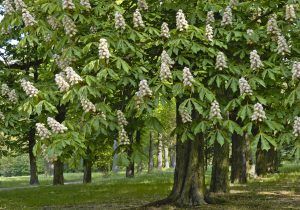 It is possible to work the chestnut tree with a couple of annual fertilizers that you will have to execute during the months of May and September.
It is possible to work the chestnut tree with a couple of annual fertilizers that you will have to execute during the months of May and September.
You will do these like this, whether the chosen fertilizer is organic or mineral because, in both cases, the purpose is the same.
In any case, it is essential to have some idea of the soil conditions and assess the nutritional status of the chestnut tree because that will help you define the best times to fertilize.
Take into account that although this is a recommendation by specialists, not all plantations have the same characteristics.
What nutrients do chestnut trees need?
To achieve an excellent production of chestnut trees, you need them to have sufficient nutritional resources even before planting. These are reduced to the three main macroelements of preference: potassium (K), nitrogen (N) and phosphorus (P).
Although the need exists in all phases of life, you need to know that each one has a leading role depending on the stage. The development of a healthy plant from sowing will be achieved through nitrogen.
Let’s say that this nutrient is like the battery that allows all the branches and leaves to form and gives the plant a structure. When time progresses and the flowering and fruit formation season begins, the presence of phosphorus and potassium becomes more important.
Therefore, you will have to ensure that the fertilizers you apply are of appropriate proportions to fulfill this purpose. Micronutrients must also be present in their correct proportions, which is why many specialists in the field recommend mineral fertilizers.
What kind of fertilizers do chestnut trees need?
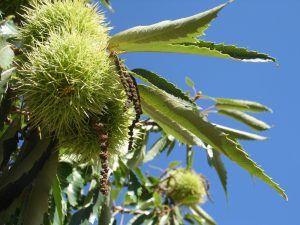 Chestnut trees can take advantage of the nutritional resources of different types of fertilizers.
Chestnut trees can take advantage of the nutritional resources of different types of fertilizers.
Homemade organics are cheap, have macro and micronutrients and are slow-release.
But perhaps the main benefit they have is that they help to nourish the chestnut, while drastically improving soil conditions.
The biggest drawback is that organic fertilizers of this type have a variable composition, so you will have difficulty adding a specific nutrient.
There is also the possibility of taking advantage of liquid fertilizers, which are very useful to generate almost immediate actions in crops.
And the mineral fertilizers that are the ones that we find in stores with the acronym of NPK that have the advantages of coming with a specific formula.
This means that you have the opportunity to know exactly how much concentration each component has. They are also fast acting.
How do we prepare fertilizer for chestnut trees?
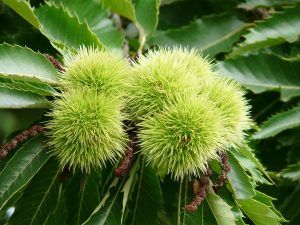 Organic fertilizers have to be used with an appropriate level of fermentation before applying to the farmland.
Organic fertilizers have to be used with an appropriate level of fermentation before applying to the farmland.
This will help the material mix better with the soil and the plant will absorb nutrients more easily.
However, you must take into account that the form of application should not be directly on the roots because if it contains high levels of nitrogen, for example, it will be harmful.
Ideally, you should create a furrow around the plant and add the fertilizer there. This will be released and will give you the necessary resources little by little. In the case of working with mineral fertilizers, it is preferable to use one with a balanced composition, especially if you do not have much experience.
This will help you not to go overboard with any of the nutrients, as an excess of any can be almost as harmful as a deficit. And make sure you always follow the steps recommended by the manufacturer.
How do we detect if the chestnut trees need fertilizer?
Chestnut trees show nutrient deficits in different ways, depending on the nutrient that is failing.
The lack of nitrogen will negatively influence the growth of the chestnut, so if you notice that it is growing slowly, you have to act immediately.
The reduced number of chestnut trees will also be a consequence of a nutrient deficit, especially potassium and phosphorus. Fertilizing chestnut trees does not have to be a headache if you manage it efficiently, taking into account what has been explained above.
It is also worth telling you that soil studies are the most accurate tool you have to know exactly the nutritional status of your substrate.
In other words, if you have the possibility to make them, it will be the best strategy to give the chestnut trees the resources they need and meet their requirements. Take note of all the points that we touch on in this post because you do not know when they will be useful to get you out of trouble with your chestnuts.
Bibliographic references
- The chestnut tree, fruit tree, AJ Izquierdo – 1978 – mapa.gob.es
- Castanea sativa Mill, BC VALERA, JPM GUIJO – mitec.gob.es
- Species of forest interest in the Iberian Peninsula: chestnut (Castanea sativa), VH Núñez – researchgate.net
- Chestnut ink disease, C Taveira – Bol. Ser. Plagas, 1979 – mapa.gob.es

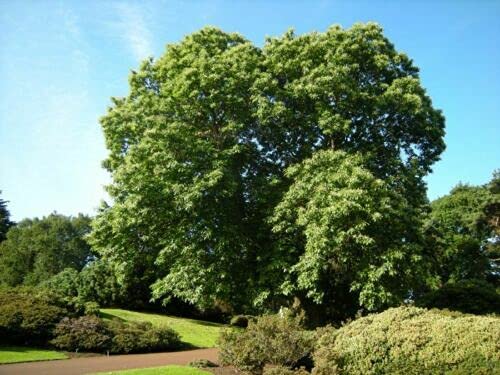

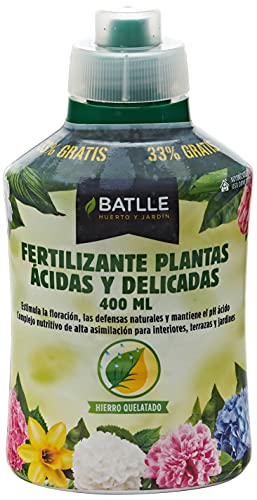
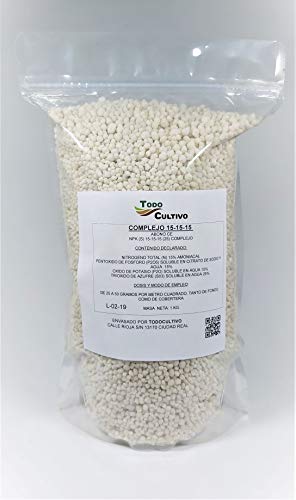
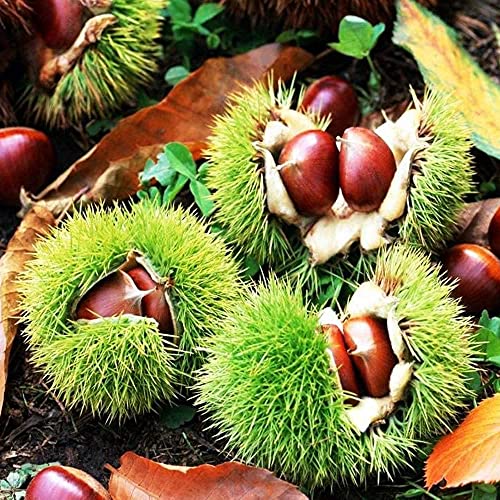
![Photo of Prune Lavender: [Importance, Season, Tools, Considerations and Steps]](https://www.complete-gardening.com/wp-content/uploads/2022/08/prune-lavender-importance-season-tools-considerations-and-steps-390x220.jpg)
